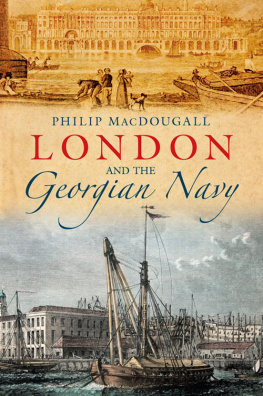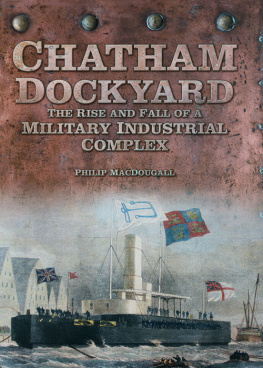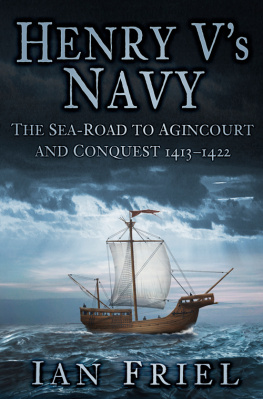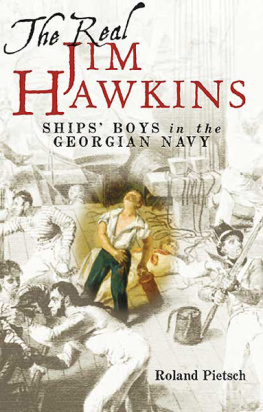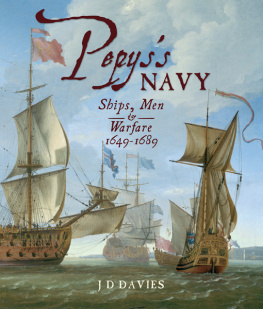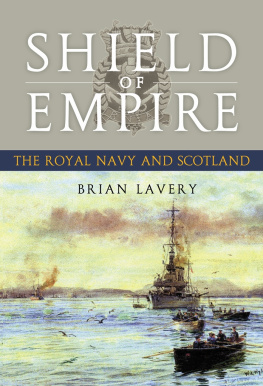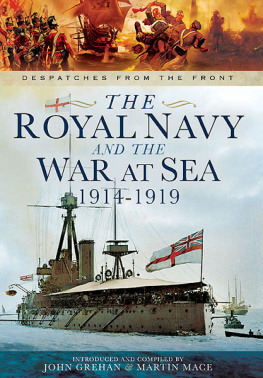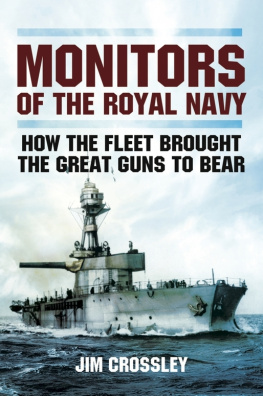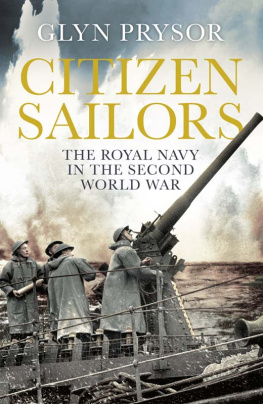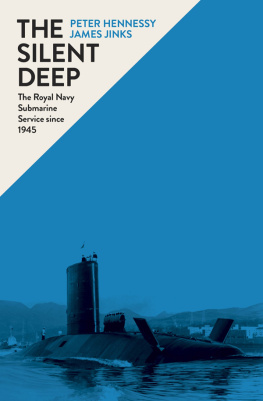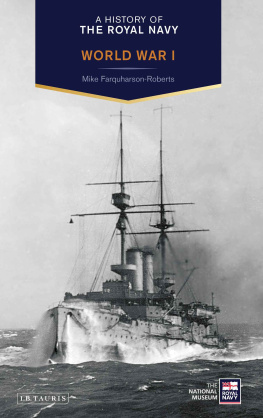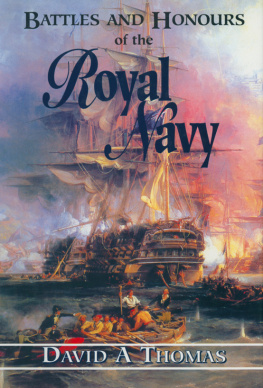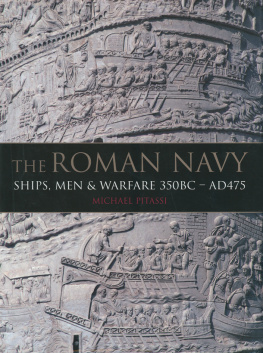
Front cover illustrations. Top : Somerset House from the south or riverside, c . 1820; below : The naval dockyard at Deptford in 1810.
Contents
PART 1:
Introduction
PART 2:
Introduction
PART 3:
Introduction
PART 4:
Introduction
While many books have been published on the history of London, none have concentrated on the metropolis and its associations with the Royal Navy. Yet, as I demonstrate in this book, there were few areas of the capital that were not, in some way, either connected with the Navy or dependent upon it for survival and growth.
The most obvious connection was that London was the centre where all decisions relating to the Navy were taken and then actioned. Here, the Palace of Westminster and Downing Street were important players in the decisions taken as to levels of funding and how the fleet would be deployed. In addition, the Admiralty possessed a number of administrative buildings strung across London, together with supply and manufacturing bases that turned a government desire into actuality.
As for the City, Londons original business zone, this was no less connected with the Navy. During the Georgian period the City was dominated by expanding mercantile companies together with the banks. Indeed, it was entirely dependent upon the sea service for its very existence. Without the Royal Navy there would have been few possibilities for growth, given that the Citys financial expansion was very much dependent on overseas trade. Fundamentally, the Navy ensured the existence of safe sea lanes that permitted extensive numbers of London-based companies to embark upon overseas trade in the first place. Of equal importance was a strong and powerful Navy able to support overseas military expeditions of conquest that also created trading monopolies controlled by the larger City trading enterprises. And this goes without even mentioning the Navys own insatiable desire for materials, much of them met by London-based merchants operating through the city markets. In fact, the Navy was as dependent on the City, as the City was upon the Navy. While the latter provided security for overseas trade, the City ensured that the infrastructure (including credit facilities) was available for the Navy to expand in unison with trade.
Another important connection with the Navy existed to the east of the City and in many of those outlying parishes that were part of the great urban conglomeration. Administratively separate from London they might have been, technically falling into the counties of Essex, Kent and Middlesex, but physically they were either indistinct or, in the case of Kentish London, rapidly becoming indistinct by way of geography and common pursuit from the city. Here existed the Navys industrial base: various dockyards, both private and government owned, that built and repaired many of the Navys ships while also housing the artisans who carried out this skilled work. Nor did it stop there, for on the east side of London were various centres for the processing and storage of food as required by the crews of these same warships together with storage areas for various items of ships equipment including ordnance.
And the connection still does not end. A sizeable proportion of any crew that manned the Navys warships would also be drawn from London. Many ships had 30 per cent or more of their crew drawn from the London area. This particularly applied to the lower deck, the seamen who carried out the labour-intensive tasks of moving the sails and manning the guns. For the most part they also came from the east side of the metropolis, an area dominated by the shipping world and so spawning trained seamen in great number. In total contrast, the more affluent areas to the west were home to many officers of the quarterdeck, not necessarily born and bred in London, but living there because of its proximity to the Admiralty.
1
Georgian London and the Royal Navy were a completely intertwined entity. Each and every sector of the great metropolis was connected in some way with the sea service. The most palpable of these links was direct employment, with thousands of Londoners at various times having either served on board a ship of war or contributed to the work that kept the Navy at sea. Far less obvious was the connection that most others in London also had with the Navy, through the fact of Londons wealth being dependent on the ability of the Navy to protect overseas trade. London was entirely reliant on this trade, being a great commercial city that had been created to sustain the merchant and the financial profits he generated. Everyone who lived in London benefited in some way from the Navy. It was a symbiotic connection but, because of its partial invisibility, many were quite oblivious of this uncontracted bond.
How could it be otherwise? The near-destitute crossing sweeper or marginally better off waterman might make few connections between the possession of an income, however minimal, and the wealth that supported the complex infrastructure of which they were a part. But recognition of the Navy as special was something they did share with those who, through being more closely connected with commerce, were more aware of how the naval and commercial world were mutually dependent.
Of course, there were down sides to this close association, and these affected Londoners in different ways. Most obvious was the expense of maintaining such a force: this was borne by those with any sort of income. And even if you could not afford to pay for the Navy, you might end up serving in it. The press gang was only one way that the Navy recruited men to its service. But any resulting concerns were seemingly put aside when the capital was mourning a naval loss or celebrating a triumph. Sea battles, in particular, would result in adulatory crowds, celebratory banquets and gifts galore poured upon those who had orchestrated such a masterful stroke. Similarly, anyone perceived to have failed or to have acted against the immemorial traditions of the service, would find a London mob stoning the windows of their town houses or having an effigy of their likeness publicly burnt.
The Battle of Trafalgar, resulting in the destruction of a combined French and Spanish fleet, was one of the most decisive naval engagements ever fought. It brought Londons adulation of the Navy to new heights. Yet the tone of the celebrations was tempered by the loss of the citys favourite admiral, the often controversial Lord Nelson. As one London newspaper, The Times editorialised:
That the triumph, great and glorious as it is, has been dearly bought, and that such was the general opinion, was powerfully evinced in the deep and universal affliction with which the news of Lord Nelsons death was received. ( The Times , 7 November 1805)
Suggestive, indeed, of a widely held viewpoint was the notion, also pursued by The Times , that:
There was not a man who did not think that the life of the Hero of the Nile was too great a price for the capture and destruction of twenty sail of French and Spanish men of war. ( The Times , 7 November 1805)
The Morning Post , another widely read London newspaper, put a different spin on the event, but still regarded the loss of Nelson as a tragedy:
But while we mourn at the fate of Britains darling son, we have the consolation to reflect that he has closed his career of glory by a work that will place his name so high on the tablet of immortality, that succeeding patriots can only gaze with enthusiasm, scarcely hope to reach the envied elevation, whilst a nations tears, to the latest period of time, will drop like so many bright gems upon the page of history that recalls the fall of the great hero. ( The Morning Post , 7 November 1805)
Next page
